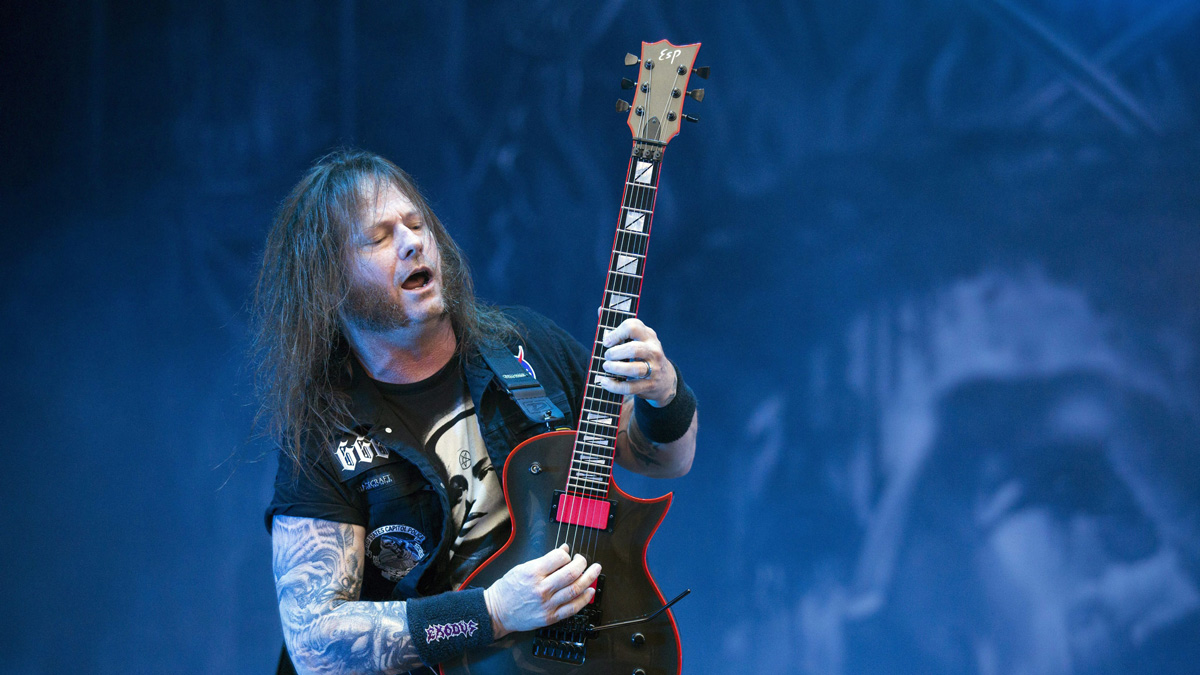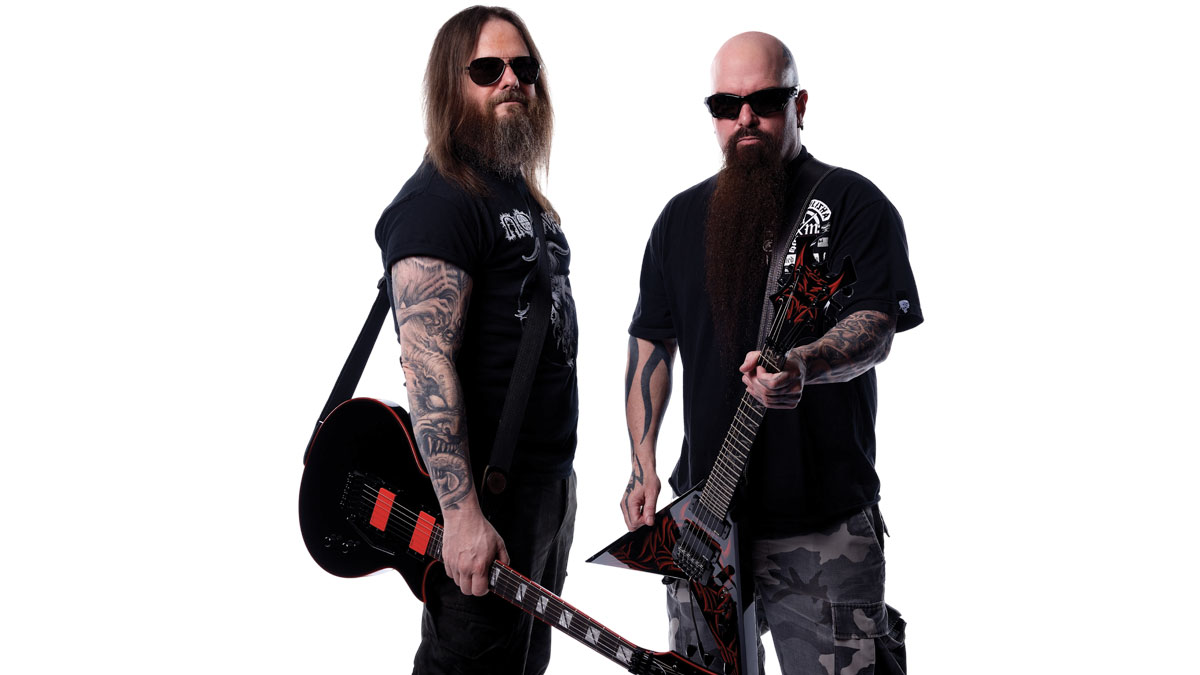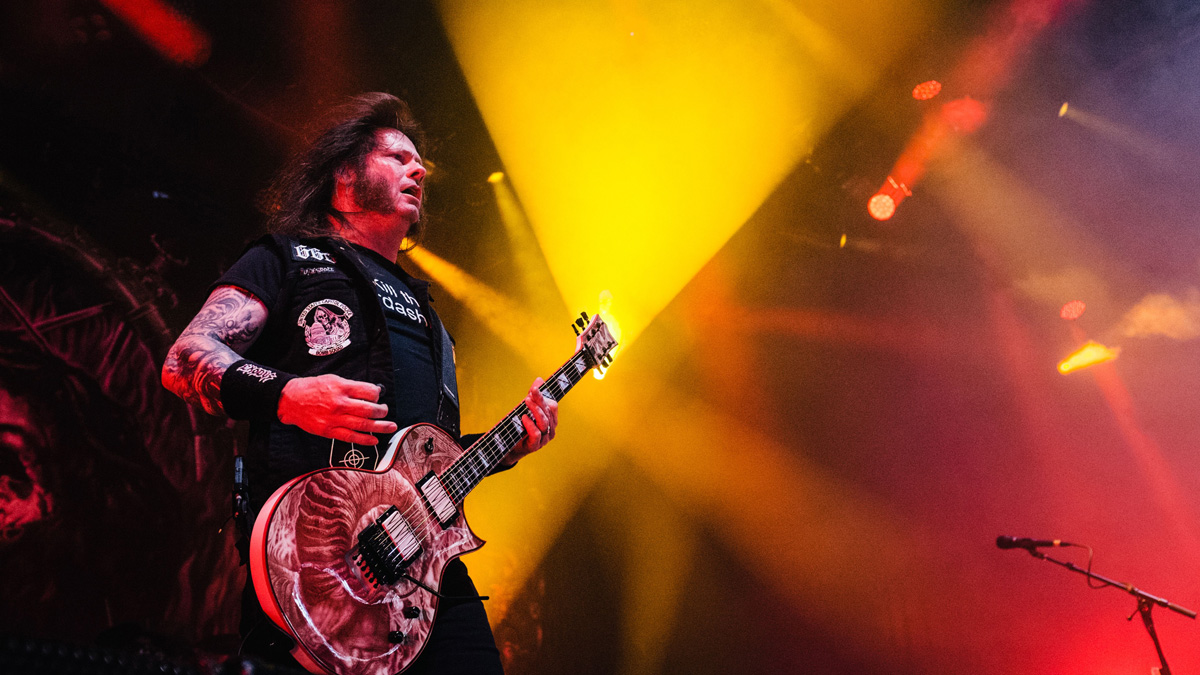Slayer's Gary Holt: "Don’t sacrifice feeling for technical perfection"
Guitarist on his top Slayer solos, writing new Exodus material and the rigours of the road

Gary Holt is tired. With the rigours of touring with thrash icons Slayer and work underway on a brand new Exodus album, it’s little wonder that Holt is feeling the pace a little.
Not that you'd have noticed from his performance at this year's Download festival. The second the stage lights dip, Holt snapped into action. As always, his performance is nothing short of staggering, and having caught him live several times previously since he joined the band in 2011 (when he stepped in for Jeff Hanneman, who tragically passed away in 2013) we can confirm that this was no fluke.
Before Holt hit the stage, we sat with him and wanted to jump straight into all things Slayer: studio, solos and a whole lot more.

What was the process of tracking on Slayer’s Repentless album like for you?
“I went in and did all of my solos in one day. I’m glad that I did because I blew out a tendon in my left wrist. It was hurting but I kept going for it and then the next day I couldn’t even move my hand. I should have stopped when it started hurting and come in the next day.
“I did all the solos in one day but Slayer solos are on the shorter side, usually. Exodus songs are sometimes 11 minutes long and a good chunk of that could be solos. So it sounds like a lot doing all of the solos in a day but some were quite brief, just these spontaneous bursts.”
Are there any solos in particular from the Slayer back catalogue that you love?
Get the MusicRadar Newsletter
Want all the hottest music and gear news, reviews, deals, features and more, direct to your inbox? Sign up here.
“I love the solo sections on Hell Awaits, Fight Till Death, The Antichrist, Angel Of Death is one where I have lots of room to roam. Before I joined the band, I loved Spirit In Black, that is a really good Jeff solo.”
I did all the solos in one day but Slayer solos are on the shorter side, usually. Exodus songs are sometimes 11 minutes long and a good chunk of that could be solos
What makes a great solo?
“The solos that I love playing are more about what is going on behind it rather than anything that I’m doing. Live, if the band behind me is ripping then that is really inspiring. On things like Show No Mercy, there is some melody going on so that gives me the opportunity to bring out some melodic stuff in the leads that I might not be able to do on something like Hell Awaits. I get to stretch out, as long as it doesn’t clash with what else is going on in the band.”
What kind of balance do you strike between staying faithful to the old solos and making them your own?
“The band gives the freedom to put my own feel on the Slayer solos. Some nights it doesn’t work, some nights it really works and I think, ‘Too bad I’ll never replicate that again!’
“When Jeff was still with us, they didn’t ask me to replicate what he was doing. They didn’t want me to be Jeff because no one can replicate Jeff. His guitar style is so unique to himself. It would be a disservice to him for me to try and play like that.
“What I try to do is I try to match his vibe. If his solo is real frantic and fast then I will try to do something frantic and fast as well. On his earlier stuff he would have real structured melodic parts in his solos and I try to keep those in there and do my own stuff around it. It’s like having a song written into the solos.”
The band gives the freedom to put my own feel on the Slayer solos. Some nights it doesn’t work, some nights it really works and I think, ‘Too bad I’ll never replicate that again!’
So, the freedom is there if you want it?
“With this long in the band when it comes to a certain song I kind of know what I’m going to do for the solo and then I will improvise from there. Sometimes it works out wonderfully and sometimes I will look at my guitar tech and he will just go, ‘No, dude!’ Then I’ll do something good and he’ll be punching his fist and I’ll aim for that again the next day.”
What’s the key to writing a great solo?
“Just practise, that is the main thing. You need to develop some soul in your playing. Some people try to play like Yngwie before they can play like Angus. I’d rather play like Angus, anyways… [laughs] Ted Nugent was a big influence to me early on, Ritchie Blackmore, Gary Moore, John Sykes, the list guys on.
“For me it’s mostly hard-rock guys. I love Ritchie Blackmore’s tone, his songwriting, his vibrato, his subtle rhythm playing that you don’t even notice there sometimes, but he will be doing this cool stuff to layer in with the keyboard line with Ronnie singing over it. I’m glad to see Ritchie back now. I think his new singer is really good. I wish he had called some of the older guys from his bands. I think the rhythm section wasn’t up to the standards of guys like Cozy Powell and Ian Paice.”

You have a long-association with playing Vs, but also your own ESP Eclipse signature guitar - what can we expect to see you using on stage?
“I’d been playing Vs for so long and I was leaning more towards the Eclipse with the Les Paul shape. My signature guitar came up perfectly. The high-end model is one of the finest guitars I have ever owned, if not the finest. They are really heavy, which my back does protest against a little bit on stage. I still use the LTDs for some stuff on stage as well and they’re quite a bit lighter so it gives my back a little bit of a break.
“I’ve had spinal problems for years and I’m starting to get to grips with it. I have an inversion table on tour to hang upside down and keep my back straight and I work on core strength to take care of it. But swinging your head around on stage 5,000 times a night isn’t good for your body, but I don’t know any other way to do it, so fuck it!”
Are you a collector of gear?
“I am a collector of gear. I’ve got a lot of stuff stockpiled. Every now and then I will thin out the herd. I couldn’t ever let go some of my old Jacksons - some of those are really rare. I have a Jackson Soloist Arch Top. There's a whole website dedicated to finding surviving members of their range. I’ve got number 28 of those and it's worth about $15,000 - that’s a pricey guitar. I’ve got a couple of Les Pauls that I couldn’t let go as well.”
Swinging your head around on stage 5,000 times a night isn’t good for your body but I don’t know any other way to do it...
What is the latest status with Exodus? Is there a new album coming?
“I’m writing a new Exodus album at the moment but we’re in no hurry. We hope to be in the studio towards the end of the year while Slayer has an end-of-year hiatus. It's difficult to juggle both bands. Kragen Lum fills in for me in Exodus when I can’t be there, which feels like all of the time these days. He does a great job. I’ve done a couple of tours doing double duty and playing with both bands each night, but that is punishing.”
Does switching from Slayer to Exodus take a little adjustment time?
“I’ve been in Exodus since I was 17; I’m 53 now. It has been my baby all that time so writing for Exodus is second-nature to me. I’ve got thousands of riffs. I have a mobile recording setup for on the road and I had prepared to do it on this tour, but so far this tour has been so tiring that the last thing I want to do on a day off is play more guitar.”
And finally, what’s your number one tip for the studio?
“Don’t sacrifice feeling for technical perfection all of the time. Guys might want to get everything technically perfect in the studio but they don’t realise that there is something magical about a take that is not technically perfect. It’s more human.
“I don’t like to chop shit up in the studio. If I have a mistake and I really want to get something I will punch in and get it but I don’t believe in comping solos together. I don’t like that - who wrote it? The guy sitting there with the mouse in his hand.”
Slayer's Repentless is out now via Nuclear Blast Entertainment.
Rich is a teacher, one time Rhythm staff writer and experienced freelance journalist who has interviewed countless revered musicians, engineers, producers and stars for the our world-leading music making portfolio, including such titles as Rhythm, Total Guitar, Guitarist, Guitar World, and MusicRadar. His victims include such luminaries as Ice T, Mark Guilani and Jamie Oliver (the drumming one).
“Every note counts and fits perfectly”: Kirk Hammett names his best Metallica solo – and no, it’s not One or Master Of Puppets
“I can write anything... Just tell me what you want. You want death metal in C? Okay, here it is. A little country and western? Reggae, blues, whatever”: Yngwie Malmsteen on classical epiphanies, modern art and why he embraces the cliff edge










